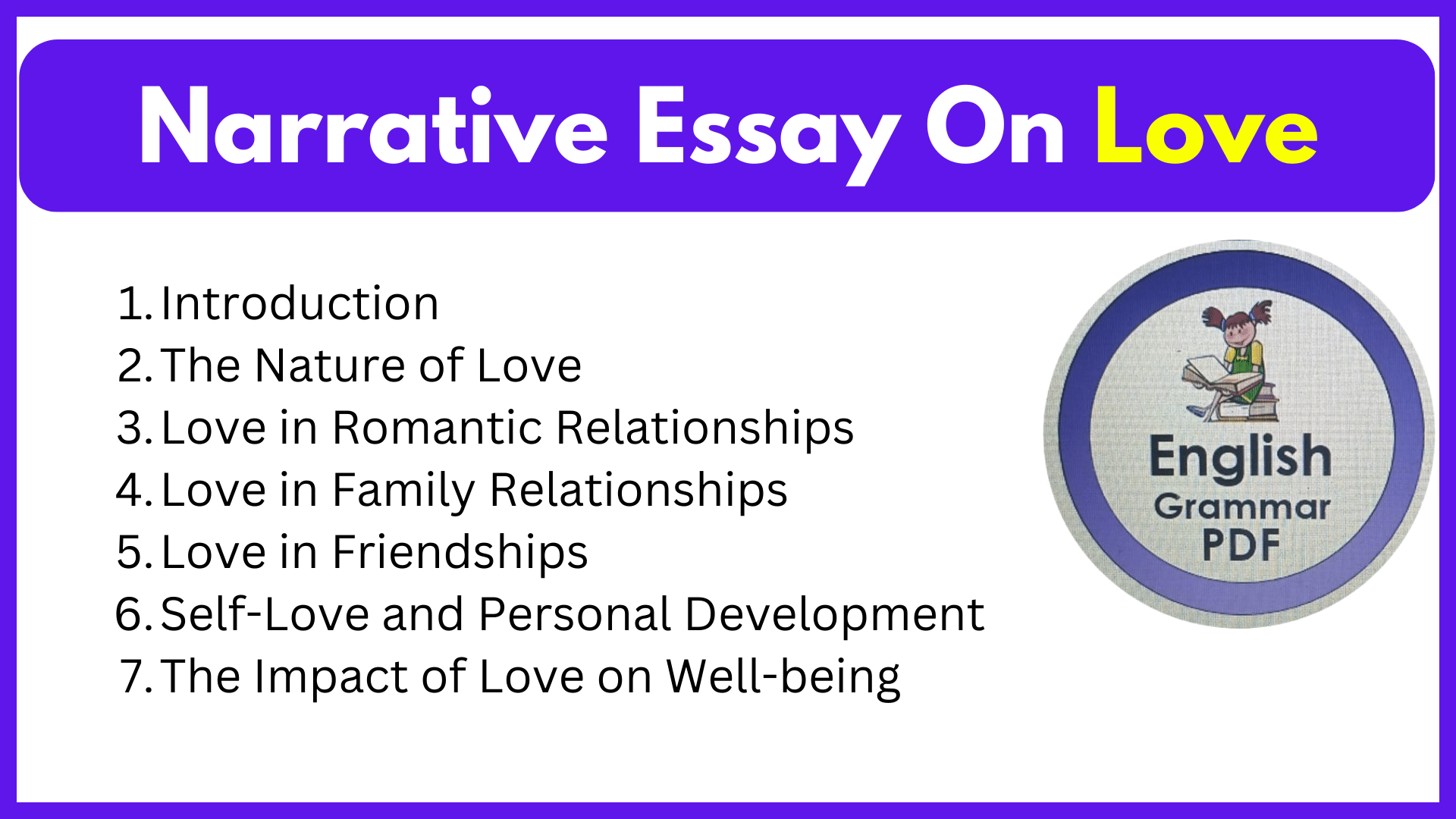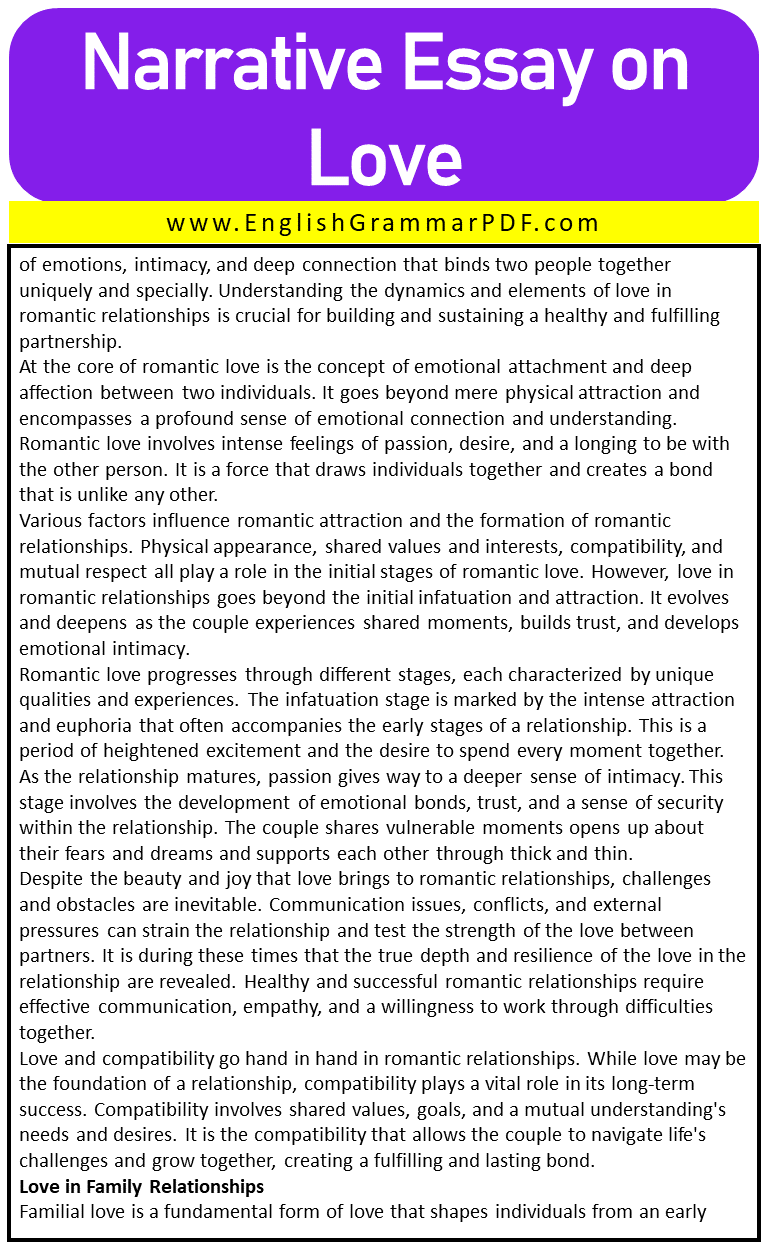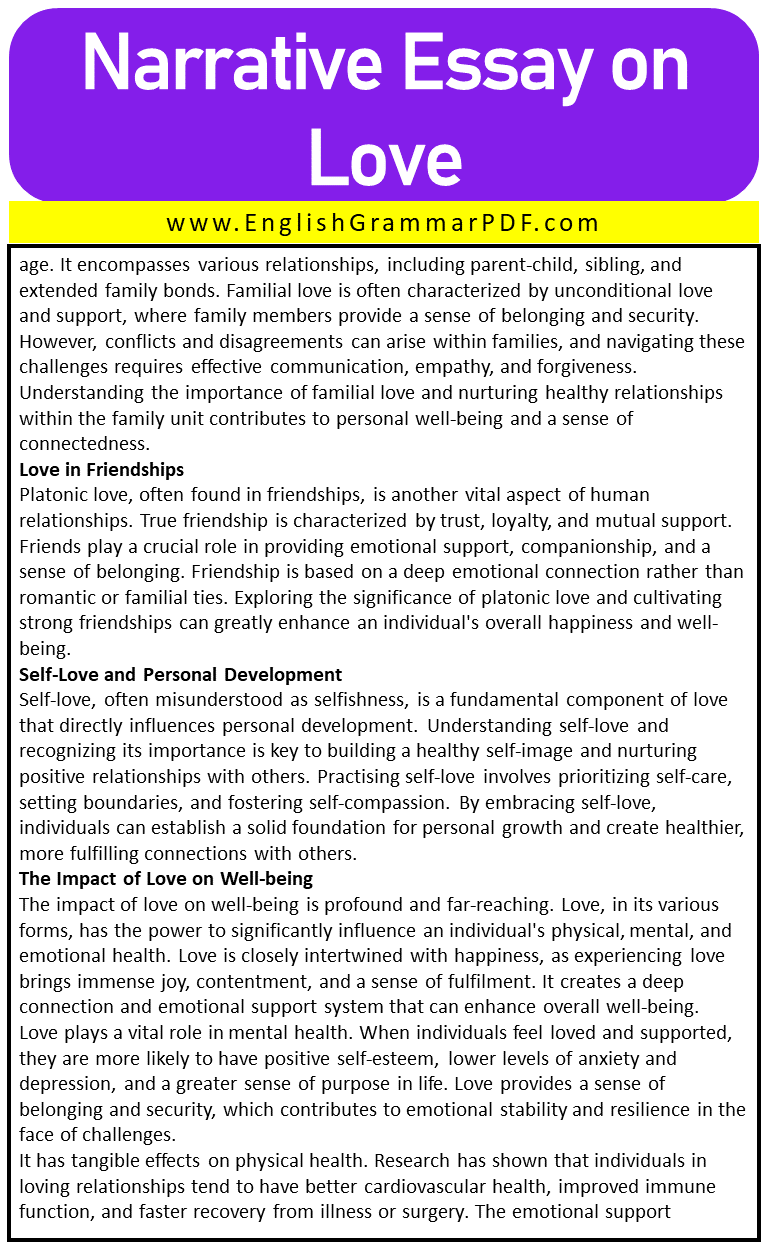Narrative Love Essay
Outline of Essay:
- Introduction
- The Nature of Love
- Love in Romantic Relationships
- Love in Family Relationships
- Love in Friendships
- Self-Love and Personal Development
- The Impact of Love on Well-being
Introduction
Love is a complex and multifaceted emotion that plays a crucial role in human relationships and personal development. It is a concept that has been contemplated and explored throughout history and across various cultures. Love holds immense importance in human life, shaping our connections with others and influencing our overall well-being. This essay aims to delve into the different aspects of love, examining its nature, its role in various relationships, its impact on personal growth, and its influence on society as a whole.
The Nature of Love
The nature of love is a complex and fascinating subject that has captivated human beings throughout history. Love is not just a modern invention; it is a universal human experience that transcends cultural boundaries and touches the core of our being. To understand the nature of love, it is essential to explore its historical and cultural perspectives, its various forms, and its emotional and physiological aspects.
Love has been a theme of contemplation and exploration across different cultures and periods. From ancient Greek concepts of love, such as eros, agape, and philia, to the romantic ideals of the Renaissance, societies have grappled with understanding and defining this powerful emotion. Love’s expression may differ across cultures, but its essence remains a fundamental aspect of the human experience, representing a deep connection and affection between individuals.
Love takes on different forms, each with its unique qualities and dynamics. Romantic love, often portrayed in literature, music, and art, is characterized by intense passion, desire, and emotional attachment between two individuals. It involves a profound sense of attraction and longing for one another. Familial love, on the other hand, encompasses the bonds shared between family members. It includes the love between parents and children, siblings, and extended family. Familial love often involves unconditional support, care, and a sense of belonging.
Love in Romantic Relationships
Love in romantic relationships is a profound and transformative experience that has captured the hearts of individuals throughout time. It is a complex blend of emotions, intimacy, and deep connection that binds two people together uniquely and specially. Understanding the dynamics and elements of love in romantic relationships is crucial for building and sustaining a healthy and fulfilling partnership.
At the core of romantic love is the concept of emotional attachment and deep affection between two individuals. It goes beyond mere physical attraction and encompasses a profound sense of emotional connection and understanding. Romantic love involves intense feelings of passion, desire, and a longing to be with the other person. It is a force that draws individuals together and creates a bond that is unlike any other.
Various factors influence romantic attraction and the formation of romantic relationships. Physical appearance, shared values and interests, compatibility, and mutual respect all play a role in the initial stages of romantic love. However, love in romantic relationships goes beyond the initial infatuation and attraction. It evolves and deepens as the couple experiences shared moments, builds trust, and develops emotional intimacy.
Romantic love progresses through different stages, each characterized by unique qualities and experiences. The infatuation stage is marked by the intense attraction and euphoria that often accompanies the early stages of a relationship. This is a period of heightened excitement and the desire to spend every moment together. As the relationship matures, passion gives way to a deeper sense of intimacy. This stage involves the development of emotional bonds, trust, and a sense of security within the relationship. The couple shares vulnerable moments opens up about their fears and dreams and supports each other through thick and thin.
Despite the beauty and joy that love brings to romantic relationships, challenges and obstacles are inevitable. Communication issues, conflicts, and external pressures can strain the relationship and test the strength of the love between partners. It is during these times that the true depth and resilience of the love in the relationship are revealed. Healthy and successful romantic relationships require effective communication, empathy, and a willingness to work through difficulties together.
Love and compatibility go hand in hand in romantic relationships. While love may be the foundation of a relationship, compatibility plays a vital role in its long-term success. Compatibility involves shared values, goals, and a mutual understanding’s needs and desires. It is the compatibility that allows the couple to navigate life’s challenges and grow together, creating a fulfilling and lasting bond.
Love in Family Relationships
Familial love is a fundamental form of love that shapes individuals from an early age. It encompasses various relationships, including parent-child, sibling, and extended family bonds. Familial love is often characterized by unconditional love and support, where family members provide a sense of belonging and security. However, conflicts and disagreements can arise within families, and navigating these challenges requires effective communication, empathy, and forgiveness. Understanding the importance of familial love and nurturing healthy relationships within the family unit contributes to personal well-being and a sense of connectedness.
Love in Friendships
Platonic love, often found in friendships, is another vital aspect of human relationships. True friendship is characterized by trust, loyalty, and mutual support. Friends play a crucial role in providing emotional support, companionship, and a sense of belonging. Friendship is based on a deep emotional connection rather than romantic or familial ties. Exploring the significance of platonic love and cultivating strong friendships can greatly enhance an individual’s overall happiness and well-being.
Self-Love and Personal Development
Self-love, often misunderstood as selfishness, is a fundamental component of love that directly influences personal development. Understanding self-love and recognizing its importance is key to building a healthy self-image and nurturing positive relationships with others. Practising self-love involves prioritizing self-care, setting boundaries, and fostering self-compassion. By embracing self-love, individuals can establish a solid foundation for personal growth and create healthier, more fulfilling connections with others.
The Impact of Love on Well-being
The impact of love on well-being is profound and far-reaching. Love, in its various forms, has the power to significantly influence an individual’s physical, mental, and emotional health. Love is closely intertwined with happiness, as experiencing love brings immense joy, contentment, and a sense of fulfilment. It creates a deep connection and emotional support system that can enhance overall well-being.
Love plays a vital role in mental health. When individuals feel loved and supported, they are more likely to have positive self-esteem, lower levels of anxiety and depression, and a greater sense of purpose in life. Love provides a sense of belonging and security, which contributes to emotional stability and resilience in the face of challenges.
It has tangible effects on physical health. Research has shown that individuals in loving relationships tend to have better cardiovascular health, improved immune function, and faster recovery from illness or surgery. The emotional support and care that come with love can reduce stress levels, lower blood pressure, and promote overall physical well-being.
It also plays a crucial role in stress reduction and resilience. When individuals feel loved and supported, they are better equipped to cope with life’s challenges. Love provides a buffer against stress and acts as a source of comfort during difficult times. It fosters a sense of emotional security and provides a haven where individuals can seek solace and understanding.
Love contributes to the development of social connections and a sense of community, which are essential components of well-being. Love fosters empathy, compassion, and a willingness to help others, creating a positive ripple effect in society. When love is shared and nurtured, it strengthens the bonds between individuals, promotes social cohesion, and contributes to a more compassionate and harmonious world.
FAQ’s
Is love a real emotion?
Primary emotions from people who study this might say that there are eight primary emotions. Love is an emotion that combines often two of the primary emotions. So love is an emotion, but you often have to figure out what its manifestation is. So love might make you feel trust.
What greatest love means?
It’s a love that is amazing and indescribable.” Some would say, “No, it’s friends for life. When you find somebody you click with and even if separated by distance and time, when you come back together it’s like you’ve never missed a beat. That’s the ultimate kind of love.”
Explore More Essays:
Parents Influence On Child Essay
Download the PDF of the Essay:







